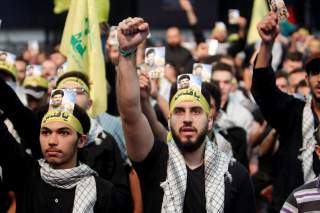Hezbollah Has Been Active in America for Decades
Hezbollah has suffered serious casualties in Syria, but also feels emboldened by its battlefield successes and may seek to flex its muscles globally.
In early June, a Bronx man named Ali Kourani was arrested and charged with casing John F. Kennedy airport in New York City for a potential Hezbollah attack. Around this same time, Samer El Debek of Dearborn, Michigan, was arrested and charged with traveling to Panama to conduct surveillance against Israeli targets and the Panama Canal. And in February, a third man, Fadi Yassine, was arrested and charged with arranging to send weapons to a Hezbollah member in Lebanon.
Americans reacted to the arrests with shock, since many were completely unaware that Hezbollah members were operating on U.S. soil.
But Kourani’s arrest should not have come as a surprise—Hezbollah has been active inside the United States for decades, engaging in a range of activities that include fundraising and money laundering. But the arrest at JFK of Kourani, who admitted to being a member of Hezbollah’s external operations wing, suggests something far more sinister.
Hezbollah-run charities such as the Mahdi Scouts, the Shia schools and the Martyrs Foundation are entities that supply charitable funds to the families of Hezbollah fighters and are an extension of Hezbollah into the community. The Martyrs Foundation operates in different countries under different auspices, and in the United States its satellite was called the Goodwill Charitable Organization, based in Dearborn and responsible for funneling contributions from members and supporters directly to Hezbollah leaders in Lebanon.
Hezbollah also operates a vast fraud network, which over time has included operatives in at least ten states, including Michigan, California, Florida, Georgia, Illinois, Kentucky, Missouri, New York, North Carolina and West Virginia. It has also established businesses in the United States, including a perfume distribution company, that have served as front organizations that helped to launder money for the Shia terror group.
Another scheme involved purchasing used cars in the United States and reselling them in Africa, part of a global money laundering network that also involved the Lebanese Canadian Bank and the mingling of funds Hezbollah garnered from cocaine trafficking.
Considering all of Hezbollah’s counterfeiting, smuggling and trafficking operations, among the most lucrative scams the group executed was a cigarette smuggling ring based in Charlotte, North Carolina. Cartons of cigarettes purchased in North Carolina for $14 could be sold in Michigan for twice as much. The group is believed to have earned tens of thousands of dollars by transporting and selling untaxed cigarettes throughout the United States.
Hezbollah has also been involved in cyber-related activities in the United States. During the July 2006 war with Israel, Israeli hackers interrupted service on Hezbollah websites. Hezbollah hackers responded by hijacking communication portals of companies, cable providers and web-hosting servers in south Texas; suburban Virginia; Brooklyn, New York; and New Jersey.
But Hezbollah members have not operated unmolested within the United States. Operation Smokescreen was an FBI intelligence investigation (overseen by the Bureau’s International Terrorism Operations Section) conducted in the mid-1990s that involved running sources and tapping phone lines. For the most part, the operation was a success, and resulted in criminal charges for twenty-six individuals accused of contraband cigarette trafficking, money laundering, racketeering, wire fraud, conspiracy, visa and marriage fraud, and material support to a terrorist group. Over 500 bank and credit card accounts were investigated as part of the financial analysis of the network.
Another undercover dragnet, Operation Bathwater, was conducted to disrupt Hezbollah activities based in Michigan and grew out of information developed in early 1999 by U.S. Secret Service agents working with the Detroit Joint Terrorism Task Force. Focused on the financial element of Hezbollah’s criminal enterprise in the United States, Bathwater uncovered what was then the largest credit card fraud scheme in U.S. history. It was run out of Toledo, Ohio, by a Dearborn resident named Ali Nasrallah.
According to a report by the Congressional Research Service, the United States has used official terrorist designations and listings to impose financial and immigration sanctions on Hezbollah and its supporters. The United States has blocked assets under its jurisdiction, prohibited American citizens from providing the group with financial or material support or engaging in financial transactions with Hezbollah and affiliated parties, and has prohibited entry into the United States and authorization of deportation for Hezbollah associated individuals.
In addition to designating certain organizations as terrorist groups, individual members of those groups can be isolated for targeting. In June 2004, the U.S. Treasury Department called Assad Ahmad Barakat, Hezbollah’s treasurer in South America, a key terrorist financier and someone “who has used every financial crime in the book, including his businesses, to generate funding” for Hezbollah.
The United States and its allies should continue to combat the financing of terrorism by working through the Treasury Department and collaborating with private-sector entities to identify and then take action against the funding of terrorist groups on U.S. soil, especially those groups acting as a proxy for Iran. As an organization, Hezbollah has suffered serious casualties in Syria but also feels emboldened by its battlefield successes and may seek to flex its muscles globally.
If nothing else, the recent arrests of Hezbollah members within the United States should serve as a stark reminder that should tensions continue to grow with Iran in the Middle East, Tehran retains the ability to strike out at U.S. interests around the globe through its proxy force, Hezbollah.
Colin P. Clarke is a political scientist at the nonprofit, nonpartisan RAND Corporation and an associate fellow at the International Centre for Counter Terrorism-The Hague.
Image: Reuters

